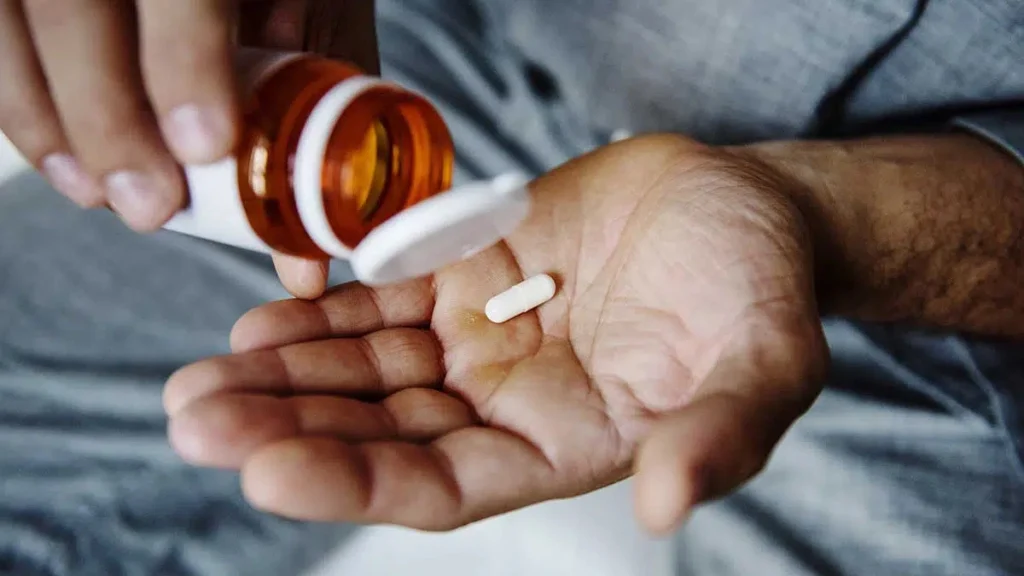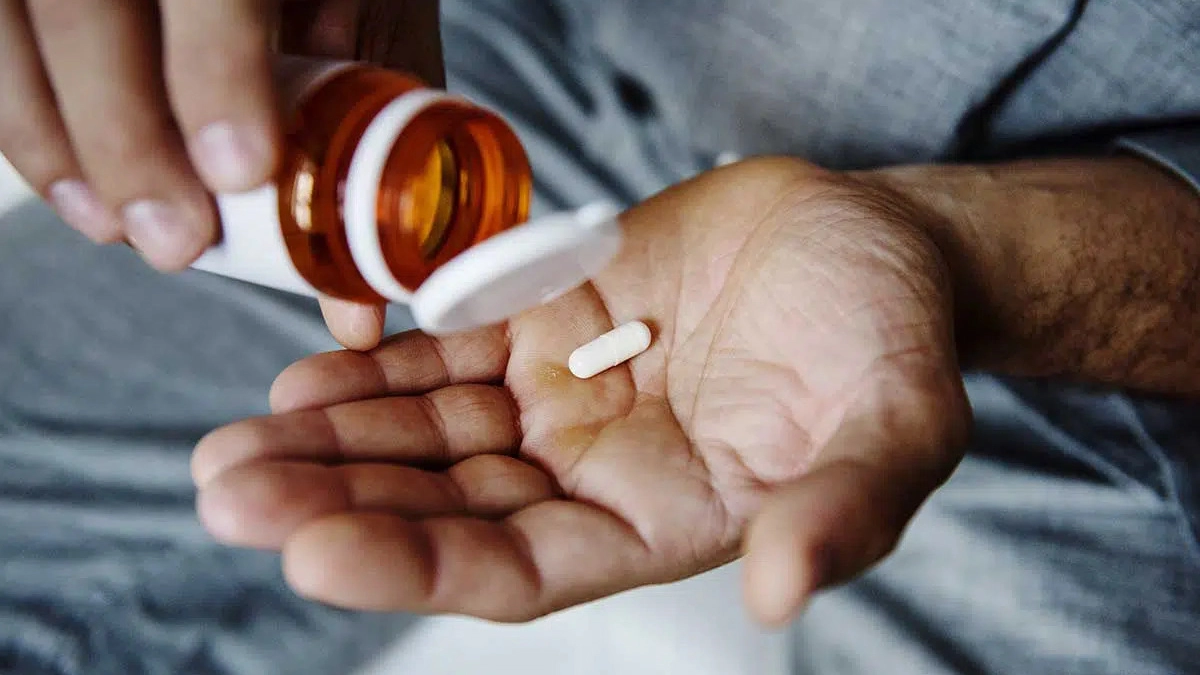In today’s society, addiction to prescription medications is a growing concern, with butalbital being one of the substances commonly abused. Butalbital is a barbiturate drug often prescribed for the treatment of tension headaches and migraines.
While it can provide relief for those suffering from chronic pain, its high potential for addiction and dependence cannot be overlooked. In this article, we will delve into butalbital addiction, exploring its signs, causes, effects, and treatment options.
Key Takeaways
Butalbital addiction is a severe condition resulting from the misuse of medications prescribed for migraine headaches. Here is what you need to know:
- Addiction to butalbital can show up in the form of various signs, including physical, mental, and behavioral.
- The complex interaction of several factors causes the onset of butalbital addiction, leading to adverse consequences.
- Numerous effective treatments are available to help individuals overcome butalbital addiction and lead a happy life.
Start your addiction recovery journey today with The Haven Detox-New Jersey. Contact us at (856) 565-3102 to get information about our treatment services.

Understanding Butalbital Addiction
Butalbital is a prescription drug often used to treat chronic tension headaches and migraines. It is a barbiturate drug that works by calming the central nervous system (CNS). Butalbital is usually combined with other active ingredients, like acetaminophen, aspirin, and caffeine, to enhance its pain-relieving effects. The combination products are known under various brand names like Fioricet and Fiorinal.
Butalbital addiction can happen when someone uses it excessively or for a long time. People may start to rely on it to feel normal or to cope with stress. As they use it more, their body gets used to the drug, and they may develop tolerance, requiring large doses to get the same effects. This can result in physical dependence, where the body needs the drug to function normally.
Addiction to butalbital can cause various health physical and mental health problems. It can also lead to withdrawal symptoms if someone suddenly stops taking it or reduces the dosage. These symptoms commonly include anxiety, tremors, insomnia, sweating, and even seizures. Additionally, addiction can affect a person’s relationships, work, and overall quality of life.
It’s essential to recognize the signs of butalbital addiction early on and seek medical help if needed. Treatment usually includes a combination of therapy, support groups, and sometimes medicines to manage butalbital withdrawal symptoms. With proper support, it’s possible to overcome butalbital addiction and regain control of one’s life.
Factors Contributing To Butalbital Addiction
Butalbital addiction is complex and can be influenced by various factors. Here are some common factors that may contribute to the development of butalbital addiction:
Biological Factors
Biological factors refer to aspects of a person’s biology or body that can influence their likelihood of developing butalbital addiction. Certain individuals may have a genetic susceptibility to substance abuse, making them more prone to developing an addiction to butalbital. Additionally, the way the brain responds to the drug, including changes in neurotransmitter levels, can also be a contributing factor.
Psychological Factors
Psychological factors involve a person’s thoughts, feelings, and mental health, which can impact their relationship with butalbital. Conditions such as depression, anxiety, past trauma, and stress can elevate the risk of addiction by driving individuals to seek relief through substance use. Additionally, low self-esteem, impulsivity, and a history of trauma may contribute to maladaptive coping mechanisms involving butalbital.
Environmental Factors
Environmental cues encompass the influences that surround an individual and can shape their behavior regarding butalbital use. Peer pressure, exposure to substance use within the community or family, and easy access to medication can all contribute to the development of addiction. Stressful life events, socioeconomic factors, and cultural norms regarding medication use can also influence the likelihood of addiction.
Behavioral Factors
Behavioral factors involve patterns of behavior and learned responses that contribute to butalbital addiction. Habitual use, drug-seeking behaviors, and reinforcement through positive experiences with the medication can all reinforce addiction. Additionally, co-occurring addictive behaviors, such as alcohol or drug abuse, can exacerbate the risk of developing addiction to butalbital.
By understanding and addressing these interrelated factors, individuals can take steps toward substance abuse disorder recovery and a healthier lifestyle.
Signs And Symptoms Of Addiction To Butalbital
Addiction to butalbital can manifest in various ways, including physical, psychological, and behavioral indicators. Let’s have a closer look at them:
Physical Signs
These are the observable physical manifestations that may indicate an addiction to butalbital:
- Frequent headaches or migraines, leading to increased butalbital consumption.
- Tolerance to the drug, needing higher doses to achieve the same effect.
- Withdrawal symptoms when not taking butalbital, such as tremors, sweating, or nausea.
- Disturbed sleep patterns, such as insomnia or excessive sleepiness.
- Physical symptoms of overdose, such as shallow breathing or confusion.
- Gastrointestinal issues like constipation or stomach pain.
- Increased sensitivity to pain, known as hyperalgesia.
- Dizziness or lightheadedness, particularly when standing up quickly.
Psychological Signs
These are the internal indicators of butalbital addiction that affect a person’s thoughts, emotions, and mental well-being:
- Rapid shifts in mood from euphoria to irritability or depression.
- Feeling anxious or panicky when not using Butalbital.
- Persistent feelings of sadness or hopelessness.
- Difficulty concentrating, memory problems, or impaired decision-making abilities.
- Feeling excessively suspicious or distrustful of others.
- Becoming overwhelmed by stress more easily than before.
- Feeling emotionally detached or numb.
- Strong urges or desires to use Butalbital, even when not experiencing physical withdrawal symptoms.
Behavioral Signs
These are the outward actions and behaviors that suggest an individual may be struggling with an addiction to butalbital:
- Doctor shopping or seeking multiple prescriptions for butalbital.
- Neglecting responsibilities at work, school, or home due to butalbital use.
- Changes in personality, such as becoming secretive or defensive.
- Engaging in highly risky behaviors while under the influence of butalbital, such as driving or unsafe sex.
- Social withdrawal or isolation from friends and family members.
- Financial problems due to spending money on obtaining butalbital.
- Unsuccessful attempts to quit or cut down on butalbital use.
By being aware of these signs and symptoms, individuals and their loved ones can get help and support to address the drug addiction and prevent further harm.
Risks And Dangers Of Butalbital Addiction
The risks and dangers associated with butalbital addiction are multifaceted, affecting various aspects of a person’s life. Let’s explore them in detail:
Physical Health Risks
The physical health risks of butalbital addiction can be severe and potentially life-threatening. Butalbital use for a long period can lead to tolerance, dependence, and withdrawal symptoms when attempting to stop. Overuse or misuse of butalbital may result in liver damage, gastrointestinal issues, and respiratory depression. In addition, individuals may experience increased sensitivity to pain, rebound severe headaches, and cardiovascular issues. In extreme cases, overdose can occur, leading to coma or death.
Mental Health Risks
Butalbital addiction can also have detrimental effects on mental health. Chronic use of the medication may exacerbate underlying mental health conditions or precipitate the onset of new disorders. Individuals may face severe symptoms of anxiety, depression, and psychosis due to changes in brain chemistry and neurotransmitter function. Moreover, cognitive impairment, memory problems, and impaired judgment can occur, affecting daily functioning and decision-making abilities.
Social and Occupational Risks
The social and occupational risks of butalbital addiction can disrupt relationships, careers, and daily functioning. Affected individuals may withdraw from social interactions and activities, leading to isolation and loneliness. Furthermore, butalbital addiction can impair judgment and performance at work or school, jeopardizing academic and professional success. Financial difficulties may arise due to spending money on obtaining the drug, leading to legal and economic consequences.
Recognizing these potential risks is essential for individuals to make informed decisions about their overall well-being and seek help from a healthcare professional if needed.
Treatment Options For Butalbital Addiction
Butalbital addiction can be challenging to overcome, but various effective treatment options are available to support recovery. These may include the following:
Medical Detox Programs
Medical detox programs are the first step in treating butalbital addiction. These programs offer a supervised and safe space for individuals to withdraw from the drug. Medical professionals monitor patients and manage withdrawal symptoms to ensure comfort and safety. Detox programs also prepare individuals for further rehab treatment by stabilizing their physical health and reducing the risk of complications.
Rehabilitation Programs
Rehab programs are essential for long-term recovery. Inpatient treatment programs offer intensive,24/7 care in a residential setting, which is beneficial for individuals with severe addiction. Outpatient treatment programs provide flexibility, allowing individuals to receive treatment while maintaining their daily responsibilities. Both types of drug rehab programs include therapy, education, and support to aid individuals in developing coping skills and preventing relapse.
Medications For Withdrawal Management
Medications can be used to manage the symptoms of withdrawal and reduce cravings during butalbital addiction treatment. These medications help ease the discomfort associated with detoxification. Healthcare providers may prescribe drugs like benzodiazepines or anticonvulsants to manage symptoms and stabilize the patient. Medication-assisted treatment (MAT) can also be part of a comprehensive recovery plan.
Behavioral Therapies
Behavioral therapies play a crucial part in treating butalbital addiction. These therapies help individuals understand the underlying causes of their addiction and develop healthier coping mechanisms. Cognitive-behavioral therapy (CBT) and contingency management (CM) are common approaches. Through these therapies, individuals learn to identify triggers, manage stress, and build resilience against relapse.
Support Groups
Support groups offer a sense of community and shared experience, which can be invaluable for individuals recovering from butalbital addiction. Groups like Narcotics Anonymous (NA) and SMART Recovery provide a space for individuals to share their struggles and successes with other people who understand their journey. Support groups help reduce feelings of isolation and offer encouragement and accountability.
By exploring various treatment programs, individuals can find the support they need to overcome addiction and achieve lasting recovery.
Frequently Asked Questions (FAQs)
Over time, the body can become used to the drug, leading to a need for larger doses to get the same effect. This can result in physical and psychological dependence, leading to withdrawal symptoms when trying to quit. Therefore, it’s important to use butalbital exactly as prescribed by a doctor.
Doctors usually prescribe butalbital for short-term relief of severe tension headaches, not for daily use. If you find yourself needing butalbital often, it’s essential to talk to your doctor. They can help determine the best treatment plan for managing your headaches safely and effectively.
If you suspect an overdose or experience any concerning symptoms after taking butalbital, seek immediate medical attention. It’s essential to use this medication exactly as prescribed and never exceed the recommended dose to avoid the risk of overdose and other serious complications.
Hope And Healing At The Haven Detox-New Jersey
Start your journey to a healthier, happier life today with The Haven Detox-New Jersey. We understand the challenges of substance use disorder (SUD) and are here to support you every step of the way.
Take the first step towards recovery with our medically supervised detox program, designed to cleanse your body of harmful toxins and prepare you for long-term treatment. From there, transition smoothly into our residential rehab program, where you will benefit from a combination of therapies, medication, NAD IV therapy, holistic treatments, and much more.
Don’t let another day go by—reach out to us now and discover how our compassionate, expert care can help you reclaim your life. Call us at (856) 565-3102 for more details!

